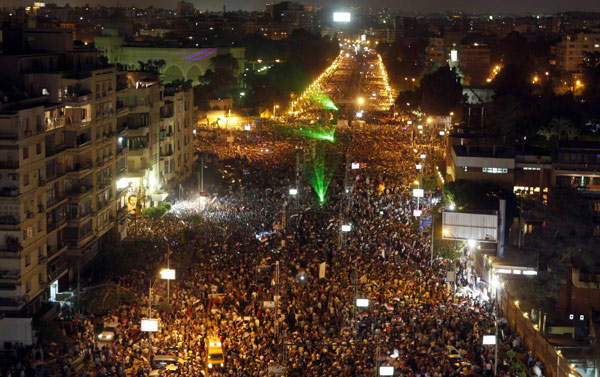Egypt's Mursi rebuffs army ultimatum
Updated: 2013-07-02 15:24
(Agencies)
|
|||||||||||
 |
|
A general view of a protest against Egyptian President Mohamed Mursi and the Muslim Brotherhood, in front of El-Thadiya presidential palace in Cairo July 1, 2013. [Photo/Agencies] |
RESIGNATIONS
A sense of disintegration in the administration since the protests on Sunday has been heightened by the resignations tendered by several ministers who are not members of Mursi's Muslim Brotherhood. On Tuesday, the state news agency said the foreign minister, Mohamed Kamel Amr, had also asked to step down.
Attacks on Brotherhood offices have added to feelings among Islamists that they are under siege.
Some Brotherhood leaders, who swept a series of votes last year, said they would look to put their own supporters on the streets. After the destruction of the Brotherhood's headquarters in a battle overnight on Monday in which eight people were killed, the possibility of wider violence seems real.
World powers are looking on anxiously, including the United States, which has long funded the Egyptian army as a key component in the security of Washington's ally Israel.
General Martin Dempsey, the chairman of the Joint Chiefs of Staff, spoke to his Egyptian counterpart, General Abdel Fattah al-Sisi on Monday, although it was unclear what was said.
President Barack Obama has urged Mursi and his rivals to compromise. But Washington has also defended the legitimacy of Mursi's election. It is unclear how far the Egyptian military has informed, or coordinated with, its U.S. sponsors.
DEADLINES
The coalition that backed Sunday's protests said there was no question of it negotiating now with Mursi on the general's timetable and it was already formulating its positions for discussion directly with the army once the 48 hours are up.
Sisi, in his broadcast statement, insisted that he had the interests of democracy at heart - a still very flawed democracy that Egyptians have been able to practise as a result of the army pushing aside Hosni Mubarak in the face of a popular uprising.
That enhanced the already high standing of the army among Egyptians, and the sight of military helicopters streaming national flags over Cairo's Tahrir Square at sunset, after Sisi had laid down the law, sent huge crowds into a frenzy of cheers.
But on the other side of Egypt's polarised politics, a Brotherhood spokesman said it might considering forming "self-defence" committees after a series of attacks on its premises.
Another leading figure in the movement, Mohamed El-Beltagy, said: "The coming period will witness an alignment between all the Islamist forces. Their sons will be called on to demonstrate in all streets and squares of the country."
Among Mursi's allies are groups with more militant pasts, including al-Gamaa al-Islamiya, a sometime associate of al-Qaida, whose men fought Mubarak's security forces for years and who have warned they would not tolerate renewed military rule.
Related Stories
Egypt army gives Mursi 48 hours to share power 2013-07-02 06:29
Egypt's Mursi working to fix errors 2013-07-01 07:33
Egypt's Morsi leaves palace amid violent protest 2012-12-05 05:25
Protests after Mursi assumes powers in Egypt 2012-11-24 12:36
Today's Top News
Chinese president meets Romanian prime minister
China reiterates stance on nuclear security
Snowden applies for Russian asylum
German firms remain optimistic
Russian rocket crashes in satellites launch
Egypt's Mursi rebuffs army ultimatum
China's stock market sees mild rebound
Tokyo warned not to resort to 'empty talk'
Hot Topics
Lunar probe , China growth forecasts, Emission rules get tougher, China seen through 'colored lens', International board,
Editor's Picks

|

|

|

|

|

|





